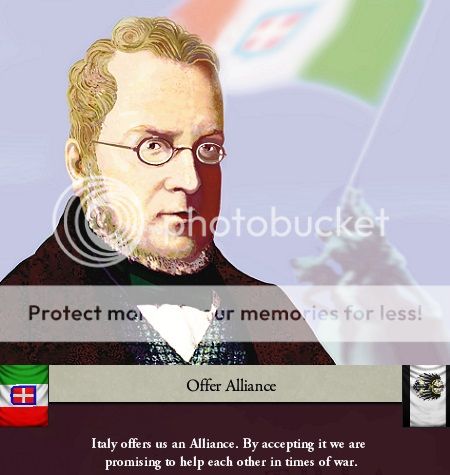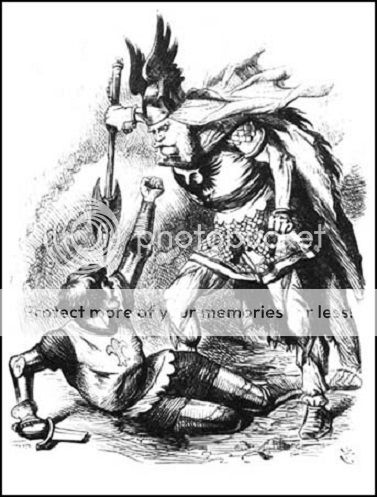1861-1863
Gott Mit Uns
Gott Mit Uns
The course of Prussian, German and European history was to be changed in the autumn of 1861 as the von Forckenbeck administration made its most important decision – moving to entangle the twin movements towards Italian and German unification. Italy had been united (with the exceptions of Rome and the Veneto – guarded by the French and Austrians respectively) by the Spring of 1861 and with the aid of France against Austria. To accept the offers of the brilliant Prime Minister Cavour of alliance was therefore quite a stunning manoeuvre. It greatly alienated the Austrians, Italy being an implacable enemy of Vienna, whilst the French were rightly nervous about a Prusso-Italian alliance. It is highly unlikely that Forckenbeck and his ministers had expected that the Italians would lead Prussia to war as soon as they did, but in accepting an alliance with a sister people also engaged in process of uniting their people they had clearly made a bold statement of the intent of their administration to rock the European balance of power.
War broke out in March 1862 pitting Denmark, France and the Papal States against Italy, Prussia and several minor German states, lasting a little over eleven months the ‘War of the Peoples’ (as it became known in Germany and Italy) claimed several hundred thousand lives and changed the balance of power in Europe forever. Following the alliance with the Prussians the Italians had moved quickly to agitate for the annexation of Papal controlled Rome – regarded as the rightful capital of Italy. At the same time a crisis was in the making in Northern Germany as the government of the Duchy of Holstein fell into the hands of a pro-Prussian clique that resisted Danish efforts at integration and looked to Berlin for support. The French Empire was implacably opposed to the loss of Rome by the Pope and any advancement of Prussian power – especially from a liberal, nationalist government with pretensions towards unification.
As Italian troop entered Rome in late February, France declared war on Italy on March 3rd, the following day Prussia declared war on France whilst also taking the opportunity to make a bid for Holstein’s independence – entering the Duchy and then Schleswig and Jutland. It is notable that several Prussian allies – most importantly Hannover – refused to march to war alongside Prussia in defence of the German nation; their betrayal would later have consequences for their independence. Meanwhile, it was only through the impressive diplomatic manoeuvrings of Otto von Bismarck – exiled to the ambassadorship to Austria in 1861 – that the Habsburgs were kept from throwing their lot in with the French.
In 1862 France was still Europe’s foremost military power – capable of fielding around one and a half times the number of troops the Prussians and Italians could muster combined, although their forces were clearly inferior to the Prussians in battle. With the Danes unable to resist, Rome following by early April and the Italians fighting a losing battle against superior French numbers and quality the war would be truly won or lost along the Rhine. Throughout 1862 and early 1863 the Prussians and French would wage a life or death struggle in the Southern Rhineland, Alsace and Lorraine. Despite winning nearly every individual engagement the Prussians struggled to hold on to territory – Strasbourg (falling in September 1862) being the only city that was captured and held for more than a few short weeks. French losses on this front were obscene, as many as three or even four times what the Prussians faced, yet their total victory on the Italian front (a victory which had seen Piedmont, Lombardy, Emilia, Romagna and Tuscany all fall one by one) and immense reserves of manpower ensured that losses could always be replenished.
By the late Summer the forces of attrition had left the Prussians in a troubling position – with the army struggling to hold on to Strasbourg, 40,000 Frenchmen had entered the Southern Rhineland. Fearing that the homeland was under threat the government finally called upon the reservists as every man capable of holding a rifle was called upon to take arms and defend the German Fatherland against Frankish invasion. The war had evolved into a life or death struggle of the German nation for the right to be born. By November the French were in headlong retreat from Prussian soil, however their route of retreat saw them escape destruction by travelling through Luxembourg, regarding the failure of the Dutch government to prevent this as a provocation Prussian troops entered Luxembourg themselves and installed a pro-Prussian Duke – bringing the Netherlands to the brink of war with Prussia, only British mediation keeping the Netherlands from marching to war. As the Danes surrendered in January – surrendering the Duchies of Schleswig and Holstein to pro-Prussian Dukes – the French began to contemplate peace. The final blow came with the fall of Nancy in March 1863, although triumphant in Italy (almost recapturing Rome itself) the French had been beaten by Prussia.
The peace treaty signed between Italy, Prussia and France in March 1863 forced Napoleon III to accept the loss of Rome to the Italians and the formation of the North German Federation – which included former Danish territory as well as the recently Dutch controlled Luxembourg (a Duchy that contained a substantial French population and greatly altered the strategic situation between France and Prussia in the favour of the Germans). Those North German states that had refused to march to war alongside Prussia in 1862 were forcibly annexed by Prussia (alongside the former Danish Duchies) while the loyal states, and Luxembourg were admitted into the new North German Federation (or Norddeutscher Bund) as quasi-independent entities. At home, the rigours of war and the creation of a whole new state had totally altered the political scene.
Economically the brief two year reign of the Forckenbeck administration had seen a mixture of economic calamity and success. In the first year of the government industry had grown by an impressive 8.3%, however during the year of war it had declined by 5.4%. The closure of old plants and the continuing process of large scale rural urban migration (not to mention the pauperisation of artisanal workers) had seen urban unemployed grow out of control in this brief period. At the proclamation of the NGF a full 100,000 men of working age were unemployed, this out of an urban craftsman population of just 350,000. This vast new population of the jobless created a potentially militant mass that was prone to criminality and political radicalism alike – seen as arguably the worst legacy of the liberal administration. Over the course of the war state debt had ballooned from under £5,000 to £27,113 – here was another area in which the government needed to take control.
Beyond this, the liberals had been highly successful in supporting the growth of the big bourgeoisie in Prussia, the numbers belonging to this elite group of industrialists and financiers more than doubling in this brief time (only a very small portion of that number coming from beyond pre-war Prussia). The past two years had clearly been a time of mixed success economically, although liberal economists claimed that North Germany would soon be alleviated of its economic troubles as the vast array of construction projects begun in this period in which investment had been actively encouraged would start to come on line in the next years and the country could recover from the war.
Politically both the right and left had suffered splits since the beginning of the War of the Peoples less than a year prior to the proclamation of the NGF. The DFP was the first to fall. As the country prepared for war the King demanded the refocusing of all resources behind the war effort, the promotion of military figures within the government and the downgrading of the role of the civilian government. With the liberals having failed to achieve a single political reform during their first year in office the prospect of surrendering their power to the military was not one the liberal left took kindly too. Von Forckenbeck’s slavish backing of King and army in the name of the national interest and German unity was widely backed within the party – with the projects of German unification and German freedom seemingly in conflict the party split between the liberal ideologues for which unification was secondary to political reform and the nationalist for whom political reform was less important than unification. From this split grew the National Liberal Party – under Forckenbeck’s leadership - and the continued (although much reduced) German Progress Party which took on a more radical, even quasi-Republican, tone.
For the right the war had been a galvanising and unifying force as the hard right moved to support the government and the strength of the conservatives was further enhanced by the defection of the left from von Forckenbeck’s government. The Conservative split was longer in the making but no less inevitable than that suffered by the liberals – for them it was to be a break between the modernists and the traditionalists, the Germans and the Prussians, the new bourgeoisie and the Junkers. The final split came only a short time after the proclamation of the NGF as debates about the nature of the new state and the project of German unification simply became too much. The traditionalists remained within the Conservative Party whilst the modernist, German nationalist Free Conservative Party saw the likes of Otto von Bismarck rally to the cause of a new right.
Before a new constitution could be drafted for the North German Federation it was decided elections should be held, whatever government they produced would then be tasked with writing the new constitution.











